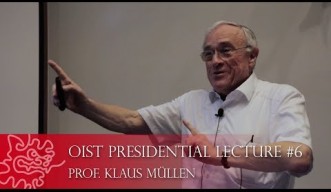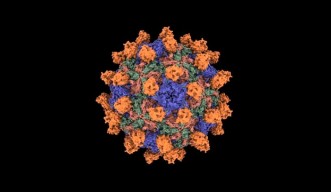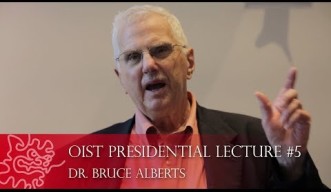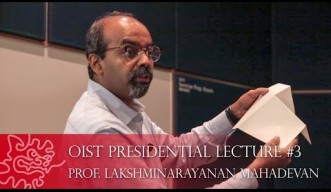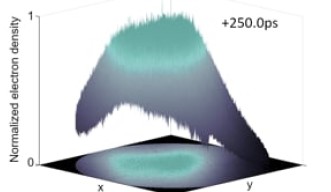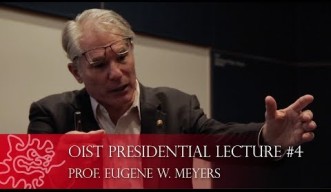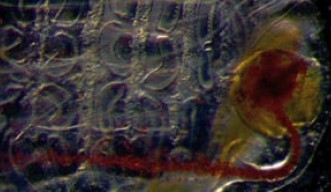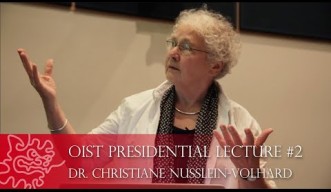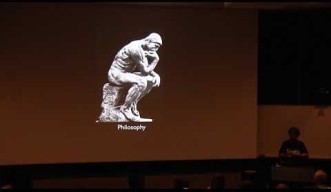"Science, Biology and the World's Future" by Dr. Bruce Alberts
OIST Presidential Lecture Series
"Science, Biology and the World's Future" by Dr. Bruce Alberts
Friday, October 12, 2018
Abstract:
There are many exciting challenges ahead for biologists. The chemistry of living organisms is so complicated that new scientific breakthroughs will be required to understand it. These understandings are certain to generate powerful new approaches for meeting human needs in health, agriculture, and the environment -- with model organisms like Drosophila continuing to provide essential shortcuts for deciphering the biology of humans and other multicellular organisms.
In addition, to make sense of the complexity will require powerful mechanisms of analysis not yet invented. As one example, even when scientists have determined each of the hundreds of different molecular interactions that create the actin cytoskeletal system, and know the three-dimensional structures and rate constants for the formation and disassembly of each of its possible sub-complexes, the challenge of computing the outcomes will remain. In the same sense, most of the interesting properties of cells and organisms are “emergent properties”, resulting from a large network of interactions that have non-intuitive outcomes.
Most broadly, the knowledge and the problem-solving skills of scientists are critical for every nation – no matter how rich or poor. Thus, for example, science has produced a deep understanding of the natural world that often enables an accurate prediction of the consequences of current actions on the future. In addition, every society needs the values of science: honesty, generosity, and an insistence on evidence while respecting all ideas and opinions regardless of their source of origin. To spread such values, science education needs to be redefined at all levels, with much less emphasis on the memorization of science facts and terms. Instead, we should be providing empowering experiences in problem-solving that take advantage of the curiosity that children bring to school and increase a student’s understanding of the world. Closely related changes in the introductory science courses in college, emphasizing “science as a way of knowing,” are the key to driving these reforms.
Biography
A prominent biochemist with a strong commitment to the improvement of science and mathematics education, Bruce Alberts, was awarded the National Medal of Science by President Barack Obama in 2014 and the 2016 Lasker-Koshland Special Achievement Award in Medical Science. Dr. Alberts served as Editor-in-Chief of Science (2009-2013) and as one of the first three United States Science Envoys (2009-2011). He is now the Chancellor’s Leadership Chair in Biochemistry and Biophysics for Science and Education at the University of California, San Francisco, to which he returned after serving two six-year terms as the president of the National Academy of Sciences (NAS).
During his tenure at the NAS, Alberts was instrumental in developing the landmark National Science Education Standards that have been implemented in school systems nationwide. The type of “science as inquiry” teaching we need, says Alberts, emphasizes “logical, hands-on problem solving, and it insists on having evidence for claims that can be confirmed by others. It requires work in cooperative groups, where those with different types of talents can discover them – developing self confidence and an ability to communicate effectively with others.”
Alberts is also noted as one of the original authors of The Molecular Biology of the Cell, a preeminent textbook in the field soon to be in its sixth edition. For the period 2000 to 2009, he served as the co-chair of the InterAcademy Council, a new organization in Amsterdam governed by the presidents of 15 national academies of sciences and established to provide scientific advice to the world.
Committed in his international work to the promotion of the “creativity, openness and tolerance that are inherent to science,” Alberts believes that “scientists all around the world must now band together to help create more rational, scientifically-based societies that find dogmatism intolerable.”
Widely recognized for his work in the fields of biochemistry and molecular biology, Alberts has earned many honors and awards, including 16 honorary degrees. He currently serves on the advisory boards of more than 25 non-profit institutions, including the Gordon and Betty Moore Foundation.







